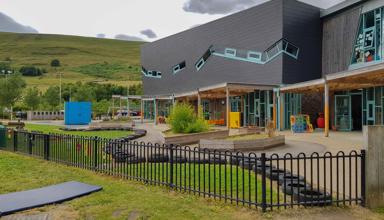“Sexual harassment among learners is shockingly commonplace”. That’s the main message from the Senedd’s Children, Young People and Education (CYPE) Committee following its inquiry into peer on peer sexual harassment. Members of the Senedd will debate the Committee’s findings in Plenary on Wednesday (26 October).
We wrote about this issue in February as the Committee began its inquiry. It followed a report by schools inspectorate, Estyn into the growing problem, which found that pupils generally don’t tell their teachers when incidents happen. Reasons include a lack of confidence they’ll be taken seriously, and that sexual harassment has become so normalised it’s too easily accepted.
The Welsh Government asked Estyn to investigate sexual harassment in and around secondary schools. This followed the greater spotlight shone by the Everyone’s Invited website, a platform for “survivors to share their stories”.
Who’s affected?
Reflecting society as a whole, girls are far more likely to be sexually harassed in and around secondary schools than boys. Estyn’s review found that 61% of female pupils had personal experience of sexual harassment, compared to 29% of males. Many stakeholders’ evidence to the CYPE Committee placed the problem in the context of societal-wide misogyny, amplified by use of pornography which creates unrealistic and unhealthy attitudes towards sex and relationships.
LGBTQ+ pupils are disproportionately affected, with Stonewall Cymru describing sexual harassment and bullying as a “huge problem”. Estyn reported that many LGBTQ+ pupils say “homophobic bullying is happening all the time”. Pupils with Additional Learning Needs can also be particularly affected.
What did the CYPE Committee say?
The Committee’s report makes 24 recommendations, including a Welsh Government national campaign to target not only learners, but their families and school staff too. This would aim to raise awareness of behaviours considered to be sexual harassment and empower pupils to call out such behaviour with confidence it will be dealt with correctly. The Committee heard inconsistencies in what is deemed sexual harassment, with much conduct dismissed as teasing or banter.
The Committee recommended the Welsh Government commission Estyn to carry out a similar review in primary schools, given that sexual harassment is likely to sometimes be a problem at younger ages as well. The Welsh Government has agreed to do this and has also commissioned a review in colleges.
There are shortcomings in the collection and analysis of data on incidents of sexual harassment. Schools do not routinely record them separately to bullying more generally, and local authorities are not monitoring the data that is collected as well as they should. As well as better use of data, the Committee recommended Estyn consider how well schools and colleges deal with sexual harassment when they carry out routine inspections.
With much of the harassment occurring online, the Committee highlighted the importance of pupils’ digital resilience and the potential of the Online Safety Bill at Westminster to better regulate content.
How has the Welsh Government responded?
The Minister for Education and Welsh Language, Jeremy Miles, and the Minister for Social Justice, Jane Hutt, said Estyn’s report “makes difficult reading”, and “highlights the uncomfortable truth about the prevalence of peer-on-peer sexual harassment in our schools”.
The Ministers were scrutinised by the CYPE Committee, where they acknowledged the severity of the problem and outlined various guidance in place to safeguard learners. The Welsh Government is producing an action plan to tackle the problem, which is expected to be published any time now. The Committee emphasised the importance of this action plan being informed and complemented by other work already underway, such as the Violence against Women, Domestic Abuse and Sexual Violence strategy, the LGBTQ+ action plan and safeguarding children policies.
The Welsh Government accepted 20 of the Committee’s 24 recommendations, accepting three in principle and rejecting a recommendation to treat peer on peer sexual harassment as an Adverse Childhood Experience (ACE). It says ACEs refer “specifically to a group of ten intrafamilial sources of childhood adversity and trauma … which have been the subject of extensive research for over 25 years”. However, it adds that a forthcoming ‘ACEs plan’ will recognise sexual harassment as part of broader experiences of childhood adversity.
A Young People’s Advisory Board will be created to co-design the Welsh Government’s response to peer on peer sexual harassment. Considerable stock is also being placed on teaching developmentally appropriate Relationships and Sexuality Education within the new Curriculum for Wales, to both better protect young people and promote better attitudes and understanding.
What happens next?
In addition to the action plan discussed above, the Welsh Government says it will publish the following, all of which are expected to include a focus on peer on peer sexual harassment:
- Updated anti-bullying guidance;
- ACEs plan;
- LGBTQ+ action plan; and
- Statutory national trans guidance.
You can watch Wednesday’s debate live on Senedd TV, and read the transcript approximately 24 hours later.
Article by Michael Dauncey, Senedd Research, Welsh Parliament






